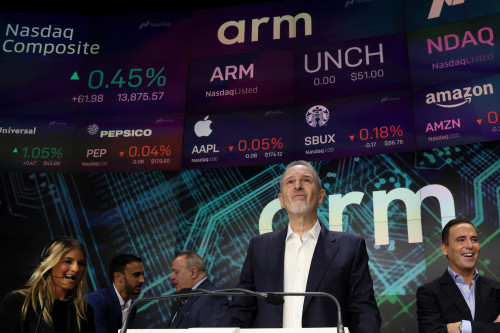By Max A. Cherney and Stephen Nellis
SAN FRANCISCO (Reuters) – Arm Holdings, a technology supplier to chip firms, is developing a long-term strategy to hike prices by as much as 300% and has discussed designing its own chips in a move to compete with its biggest customers.
For decades, the British firm kept a low profile while operating at the heart of billions of dollars of chip sales per year. It licenses the intellectual property that Apple, Qualcomm, Microsoft and others use to design their chips, charging a small royalty for each chip produced with Arm technology.
Despite being central to the rise of smartphones and energy-efficient data center chips, Arm has remained small compared to its customers, with $3.23 billion in revenue for fiscal year 2024. In its most recent fiscal year, Apple’s revenue from its hardware products, which are all powered by Arm-based chips, was more than 90 times larger.
But Masayoshi Son, CEO of SoftBank Group, which owns 90% of Arm, and Arm CEO Rene Haas, are determined to change that, according to plans revealed in a trial last month in which Arm aimed unsuccessfully to secure higher royalty rates from Qualcomm. The details of Arm’s ambitions, which were described in court testimony and documents that remain under seal, have not been previously reported.
Arm and Qualcomm declined to comment.
Known in its early stages as the “Picasso” project, Arm’s plans, which date back to at least 2019, aim for a roughly $1-billion increase in annual smartphone revenue over about 10 years, according to sealed executive testimony.
Arm planned to achieve this partly by increasing the per-chip royalty rates that customers pay for ready-made parts of chip designs that used its latest computing architecture, called Armv9.
During trial, documents were shown from August 2019 in which Arm executives discussed a 300% rate increase. In December 2019, Arm’s then-CEO Simon Segars told Son, Arm’s board chairman, that Arm had secured a deal with Qualcomm to use ready-made technology under the “Picasso” initiative.
But Qualcomm and other large customers such as Apple are sophisticated enough to design their own chips from scratch using Arm’s architecture without needing Arm’s higher-priced ready-made offerings, meaning they would not necessarily be subject to all of those rate increases.
“We have rough legacy agreements with Qualcomm and Fender,” Haas said in a Microsoft Teams chat held the day Qualcomm bought Nuvia in 2021, shown at trial. The startup would help Qualcomm use less of Arm’s ready-made technology.
“Fender” is Arm’s internal code name for Apple. Apple declined to comment.
‘CHILL’ FOR CUSTOMERS
After SoftBank acquired Arm in 2016, the British firm’s computing architecture went from powering smartphones to making big inroads in PC and data center markets.
The plans Arm executives discussed included potentially inching closer to making a complete chip design of Arm’s own, according to testimony and documents at trial. Arm sells chip-design blueprints, but most of its customers still spend months completing the chip design.
“It was news to me that Arm is even thinking about (making its own chip),” said Tantra Analyst founder Prakash Sangam, who attended the trial. “It should send a chill down the spine of their customers.”
At the trial, Qualcomm attorneys showed a slide from Haas’ presentation to Arm’s board in February 2022 when he applied to become CEO that suggested Arm change its business model. Haas said instead of selling only chip blueprints, Arm should sell chips or chiplets, a smaller building block used to make some processors made by Advanced Micro Devices and others.
In a conversation with another Arm executive a few months earlier, Haas expressed confidence that Arm could compete against its own customers if it put a chip into the marketplace, according to testimony and documents.
“(The) rest are hosed,” Haas said in a Teams message from December 2021, shown during the trial, referring to the problems chip companies such as Qualcomm would face competing with a complete Arm chip design.
During the trial, Haas downplayed those comments, saying they reflected the long-term strategic spitballing that many executives do with colleagues and board members.
Haas said while Arm never got into the chip-design business, he is always considering possible strategies.
“That’s all I think about, is the future,” he told the eight-person jury.
(Reporting by Stephen Nellis and Max A. Cherney in San Francisco and Tom Wils in Wilmington, Delaware; editing by Kenneth Li and Rod Nickel)


